
Wes Vernon
Clearing the air vs. splitting hairs and distorting Cold War history (Part 1)
Alger Hiss and Harry Dexter whitewashed
By Wes Vernon
Since the downfall of the Soviet Union, volumes have been written about that late superpower's penetration of American Society and its institutions before and during the Cold War years. It can be said without credible contradiction that what we now know about Soviet spying and infiltration of the U.S. for seven decades vindicates the much-maligned anti-Communists (in and out of Congress) of that era. If anything, they didn't know the half of it.
much-maligned anti-Communists (in and out of Congress) of that era. If anything, they didn't know the half of it.
It was they who warned — often to be met with a ton of ridicule and scorn — that there was a systematic and well-funded web of Soviet-backed subversion whose ultimate aim was to take over America from within.
And the hits just keep on coming
Shortly after the Soviet demise, the successor Russian regime allowed researchers to view the archives of the KGB and other Soviet intelligence agencies dating back to the early days of the world's former leading Communist power and the free world's main enemy after the war.
When startling revelations of those archives achieved a high level of worldwide publicity, the Russians clamped down and narrowed the scope of what was allowed to be viewed.
However, Alexander Vassiliev — a journalist and former KGB officer — managed to gain access to previously closed archives. He made notes — volumes of them — before collaborating with Allen Weinstein in the brilliant expose The Haunted Wood, published several years ago.
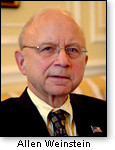 Weinstein, by the way, authored the 1978 best-seller Perjury, which clearly showed — once and for all — that Alger Hiss was rightfully convicted of lying when he said he was not a Soviet agent (only the statute of limitations enabled him to escape the charge of outright treason; perjury was his more recent act). Richard Nixon — as a young congressman — played a part in nailing Hiss in the forties. Hiss in the seventies used the political fallout from the Watergate scandal in an attempt to rehabilitate his own reputation. As for Weinstein, he went on to become the ninth archivist for the National Archives. He originally investigated the case expecting to prove Hiss innocent. When Weinstein discovered otherwise, he reported his findings in Perjury. The result was that Hiss's effort to revive his respectability on the back of Nixon's Watergate crashed and burned.
Weinstein, by the way, authored the 1978 best-seller Perjury, which clearly showed — once and for all — that Alger Hiss was rightfully convicted of lying when he said he was not a Soviet agent (only the statute of limitations enabled him to escape the charge of outright treason; perjury was his more recent act). Richard Nixon — as a young congressman — played a part in nailing Hiss in the forties. Hiss in the seventies used the political fallout from the Watergate scandal in an attempt to rehabilitate his own reputation. As for Weinstein, he went on to become the ninth archivist for the National Archives. He originally investigated the case expecting to prove Hiss innocent. When Weinstein discovered otherwise, he reported his findings in Perjury. The result was that Hiss's effort to revive his respectability on the back of Nixon's Watergate crashed and burned.
Alger Hiss: Case closed (but not for the closed-minded)
As for Alexander Vassiliev, he — in more recent times — has collaborated with two scholars, Dr. Harvey Klehr and Dr. John Earl Haynes, who have written several books revealing previously closely-guarded Cold War secrets related to Soviet subversion and espionage.
Their most recent writings resulted from their discovery that there was much more in Vassiliev's notes that deserved exposure. The result is the new revealing, heavily-footnoted, and thoroughly-documented Spies: The Rise and Fall of the KGB in America. Their very first chapter, Alger Hiss: Case Closed, puts to rest every conceivable alibi the embarrassed Hiss apologists have conjured up over the last 60 years.
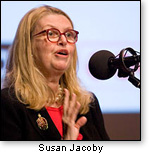 At about the same time Spies was released, another book — Alger Hiss and the Battle for History — arrived at the book stores. Author Susan Jacoby, a journalist with a newspaper/magazine background, is a liberal who concedes that Alger Hiss — alas — was guilty. She is surely not the first liberal to acknowledge this. Weinstein himself (author of the above-referenced Perjury) identified himself as a liberal. And in the early seventies, the late Rep. Richard Bolling (D-Mo.) — who had voted to deny funding for the House Committee on Un-American Activities — told me that Alger Hiss was guilty and that he wished his fellow liberals would stop trying to alibi for him, because they only made themselves look silly.
At about the same time Spies was released, another book — Alger Hiss and the Battle for History — arrived at the book stores. Author Susan Jacoby, a journalist with a newspaper/magazine background, is a liberal who concedes that Alger Hiss — alas — was guilty. She is surely not the first liberal to acknowledge this. Weinstein himself (author of the above-referenced Perjury) identified himself as a liberal. And in the early seventies, the late Rep. Richard Bolling (D-Mo.) — who had voted to deny funding for the House Committee on Un-American Activities — told me that Alger Hiss was guilty and that he wished his fellow liberals would stop trying to alibi for him, because they only made themselves look silly.
Wishing it not so
Jacoby makes it plain throughout her thin, breezy volume that she wishes — oh, how she wishes — that Alger Hiss was not guilty, but it looks like — well, the fair-haired boy stumbled...and yet — and yet — well, there must be a tiny sliver of a light somewhere that could possibly — ever so gingerly — open the door to cast doubt on the verdict that sent Alger to Leavenworth. But a "scholar" — as Jacoby considers herself — must go with the evidence.
Or maybe not. If you read both, you will note that Jacoby's book mentions none of the new findings in the Klehr/Haynes/Vassiliev Spies volume. Allowing for the benefit of the doubt, one might figure the two books more or less passed each other like the proverbial ships in the night — i.e., that at the time Jacoby's work had gone to the printers, she could not have known any of the information in Spies.
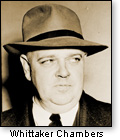 But then David Chambers, grandson of Hiss's chief accuser Whittaker Chambers, reveals in a Washington Times review of Jacoby's book that Jacoby had been offered access to the new information in Spies. "Apparently, Ms. Jacoby took a pass," Chambers concludes. (Hmm. A case of Don't confuse me with facts?)
But then David Chambers, grandson of Hiss's chief accuser Whittaker Chambers, reveals in a Washington Times review of Jacoby's book that Jacoby had been offered access to the new information in Spies. "Apparently, Ms. Jacoby took a pass," Chambers concludes. (Hmm. A case of Don't confuse me with facts?)
Airtight case
Here is how Klehr/Haynes/Vassiliev sum up their case that Hiss is guilty as charged:
"Alexander Vassiliev's notebooks quote KGB reports and cables from the mid-1930s to 1950 that document KGB's knowledge of and contacts with Alger Hiss and unequivocally identify Hiss as a long-term espionage source of KGB's sister agency GRU, Soviet military intelligence. Hiss is identified by his real name, as well as by cover names 'Jurist,' 'Ales,' and 'Leonard.' The material fully corroborates the testimony and accounts of Whittaker Chambers, Hede Massing, Noel Field, and others, while offering new details about Hiss's relationship with Soviet intelligence." And then this: "No individual is a more potent symbol of American collaboration with Soviet intelligence than Alger Hiss."
For details — see the book.
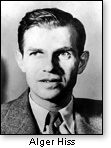 And by the way
And by the way
Some of the points Jacoby makes in her book are silly or irrelevant.
As for example, implying the case against Hiss was somehow disreputable because Republicans used it to try to discredit the New Deal. What's this? You mean when one party messes up or is embarrassed, the opposition party actually tries to try to benefit politically from it? Really? Be still, my heart!
Of course, most New Dealers were not Communists. But quite a few Communists were in fact New Dealers in the thirties and forties. Why does one suppose that is? Could it be that the class hatred spewed by FDR had an appeal to some in the Communist Party whose number one mantra is that if anyone has a heavier wallet than you do, he is obviously evil incarnate. That does not make a liberal a Communist, but it is reasonable to note, for example, that we did not find any Soviet agents lurking in the inner circles of Senators Robert Taft or Barry Goldwater. Why does one suppose that is?
Soviet spy honored by Putin
The Klehr/Haynes/Vassiliev volume notes that a previously unknown spy, George Koval, was honored posthumously in 2007 by Russian leader Vladimir Putin for having enabled the USSR to steal vital atomic secrets. Koval's treasonous path was described on 11/12/07 in the New York Times as "Iowa to A-Bomb to Kremlin Honor." He was headlined again just this month in the Smithsonian magazine. Koval's role was arguably every bit as treacherous as that of the Rosenbergs, while escaping their ultimate fate.
In the Smithsonian piece, Michael Walsh identifies Harry Dexter White, a high-ranking Treasury Department official in the Roosevelt administration, as one of the "KGB-run spies" of that era.
Some Hiss apologists — perhaps running out of alibis on that case — have turned to whitewashing the record of Harry Dexter White. That point became a bone of contention at a conference last week (May 20-21) here in Washington, where academics, researchers, and journalists (left and right) gathered for the Wilson Center's Cold War International History Project (CWIHP).
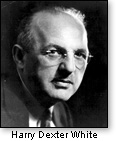 Harry Dexter White — a spy by any other name is still a...
Harry Dexter White — a spy by any other name is still a...
There were those at the conference — where wide-open debates at times became contentious — who challenged the Klehr/Haynes/Vassiliev conclusion that, in the authors' words, "the most highly-placed asset the Soviets possessed in the American government was Harry Dexter White, assistant secretary of the treasury."
An indignant letter to the editor of the Smithsonian magazine protested that "some historians do not accept that White was a Soviet agent."
But Spies reports that "More than two dozen KGB documents spanning 1941 until 1948 (the year White died) spell out his assistance to Soviet intelligence."
The authors say in their book (and reiterated at the Washington conference) that Moscow assigned a high priority to establishing direct access to White. White reciprocated — fiercely resisting plans to communicate with the KGB through an intermediary (spy ringleader Nathan Gregory Silvermaster) "jealous that it diminished his importance."
White was quoted as saying he knew full well where his information was going "which is precisely why he transmits it in the first place."
As senior adviser to the founding conference of the United Nations, White passed information to KGB officer Vladimir Pravdin in San Francisco regarding "negotiating strategy, assured him that 'Truman and [Secretary of State] Stettinius want to achieve the success of the conference at any price,' and advised that if Soviet diplomats held firmly to their demand that the USSR get a veto of UN actions, the U.S. would agree."
In that process, White offered the Soviets advice on how they could "defeat or water down positions advanced by his own government and answered a long series of questions on a variety of issues about which Soviet diplomats wanted to know American positions."
Throughout 1945, White kept Moscow "fully informed about the internal discussions within the government about Soviet requests for financial aid and a massive dollar loan."
Henry Wallace endorsed White
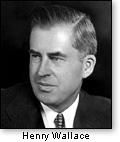 Henry Wallace — FDR's third term vice-president, but replaced on the ticket by Truman for the fourth term — decided to run for President on the Communist-backed "Progressive Party" ticket in 1948. President Truman distanced himself from — as he put it — "Henry Wallace and his Communists."
Henry Wallace — FDR's third term vice-president, but replaced on the ticket by Truman for the fourth term — decided to run for President on the Communist-backed "Progressive Party" ticket in 1948. President Truman distanced himself from — as he put it — "Henry Wallace and his Communists."
Harry Dexter White — by then out of government — had no such hang-up. He supported the Wallace bid. Wallace said that if he were to become president, White would be Secretary of the Treasury. Wallace — though not a member of the CPUSA — supported the Soviet view in the early Cold War years. He saw himself as the natural successor to Roosevelt, who treated Joseph Stalin as a trustworthy ally rather than as an ally of convenience during World War II.
Confusion?
If some "historians" are not convinced that Harry Dexter White was a Soviet agent, it may be because he was "more of a Soviet sympathizer than a disciplined CPUSA party member."
That distinction without a substantive difference (given that White acted on his "sympathies") has been seized upon by White apologists. But Klehr, Haynes, and Vassiliev insist that "the evidence is overwhelming. Harry Dexter White assisted Soviet military intelligence in the mid-1930s, and the KGB from 1943 to 1945, and perjured himself in his congressional testimony" in denying his perfidy.
And there's more...Much more. Later.
© Wes Vernon
May 25, 2009
Since the downfall of the Soviet Union, volumes have been written about that late superpower's penetration of American Society and its institutions before and during the Cold War years. It can be said without credible contradiction that what we now know about Soviet spying and infiltration of the U.S. for seven decades vindicates the
 much-maligned anti-Communists (in and out of Congress) of that era. If anything, they didn't know the half of it.
much-maligned anti-Communists (in and out of Congress) of that era. If anything, they didn't know the half of it.It was they who warned — often to be met with a ton of ridicule and scorn — that there was a systematic and well-funded web of Soviet-backed subversion whose ultimate aim was to take over America from within.
And the hits just keep on coming
Shortly after the Soviet demise, the successor Russian regime allowed researchers to view the archives of the KGB and other Soviet intelligence agencies dating back to the early days of the world's former leading Communist power and the free world's main enemy after the war.
When startling revelations of those archives achieved a high level of worldwide publicity, the Russians clamped down and narrowed the scope of what was allowed to be viewed.
However, Alexander Vassiliev — a journalist and former KGB officer — managed to gain access to previously closed archives. He made notes — volumes of them — before collaborating with Allen Weinstein in the brilliant expose The Haunted Wood, published several years ago.
 Weinstein, by the way, authored the 1978 best-seller Perjury, which clearly showed — once and for all — that Alger Hiss was rightfully convicted of lying when he said he was not a Soviet agent (only the statute of limitations enabled him to escape the charge of outright treason; perjury was his more recent act). Richard Nixon — as a young congressman — played a part in nailing Hiss in the forties. Hiss in the seventies used the political fallout from the Watergate scandal in an attempt to rehabilitate his own reputation. As for Weinstein, he went on to become the ninth archivist for the National Archives. He originally investigated the case expecting to prove Hiss innocent. When Weinstein discovered otherwise, he reported his findings in Perjury. The result was that Hiss's effort to revive his respectability on the back of Nixon's Watergate crashed and burned.
Weinstein, by the way, authored the 1978 best-seller Perjury, which clearly showed — once and for all — that Alger Hiss was rightfully convicted of lying when he said he was not a Soviet agent (only the statute of limitations enabled him to escape the charge of outright treason; perjury was his more recent act). Richard Nixon — as a young congressman — played a part in nailing Hiss in the forties. Hiss in the seventies used the political fallout from the Watergate scandal in an attempt to rehabilitate his own reputation. As for Weinstein, he went on to become the ninth archivist for the National Archives. He originally investigated the case expecting to prove Hiss innocent. When Weinstein discovered otherwise, he reported his findings in Perjury. The result was that Hiss's effort to revive his respectability on the back of Nixon's Watergate crashed and burned.Alger Hiss: Case closed (but not for the closed-minded)
As for Alexander Vassiliev, he — in more recent times — has collaborated with two scholars, Dr. Harvey Klehr and Dr. John Earl Haynes, who have written several books revealing previously closely-guarded Cold War secrets related to Soviet subversion and espionage.
Their most recent writings resulted from their discovery that there was much more in Vassiliev's notes that deserved exposure. The result is the new revealing, heavily-footnoted, and thoroughly-documented Spies: The Rise and Fall of the KGB in America. Their very first chapter, Alger Hiss: Case Closed, puts to rest every conceivable alibi the embarrassed Hiss apologists have conjured up over the last 60 years.
 At about the same time Spies was released, another book — Alger Hiss and the Battle for History — arrived at the book stores. Author Susan Jacoby, a journalist with a newspaper/magazine background, is a liberal who concedes that Alger Hiss — alas — was guilty. She is surely not the first liberal to acknowledge this. Weinstein himself (author of the above-referenced Perjury) identified himself as a liberal. And in the early seventies, the late Rep. Richard Bolling (D-Mo.) — who had voted to deny funding for the House Committee on Un-American Activities — told me that Alger Hiss was guilty and that he wished his fellow liberals would stop trying to alibi for him, because they only made themselves look silly.
At about the same time Spies was released, another book — Alger Hiss and the Battle for History — arrived at the book stores. Author Susan Jacoby, a journalist with a newspaper/magazine background, is a liberal who concedes that Alger Hiss — alas — was guilty. She is surely not the first liberal to acknowledge this. Weinstein himself (author of the above-referenced Perjury) identified himself as a liberal. And in the early seventies, the late Rep. Richard Bolling (D-Mo.) — who had voted to deny funding for the House Committee on Un-American Activities — told me that Alger Hiss was guilty and that he wished his fellow liberals would stop trying to alibi for him, because they only made themselves look silly.Wishing it not so
Jacoby makes it plain throughout her thin, breezy volume that she wishes — oh, how she wishes — that Alger Hiss was not guilty, but it looks like — well, the fair-haired boy stumbled...and yet — and yet — well, there must be a tiny sliver of a light somewhere that could possibly — ever so gingerly — open the door to cast doubt on the verdict that sent Alger to Leavenworth. But a "scholar" — as Jacoby considers herself — must go with the evidence.
Or maybe not. If you read both, you will note that Jacoby's book mentions none of the new findings in the Klehr/Haynes/Vassiliev Spies volume. Allowing for the benefit of the doubt, one might figure the two books more or less passed each other like the proverbial ships in the night — i.e., that at the time Jacoby's work had gone to the printers, she could not have known any of the information in Spies.
 But then David Chambers, grandson of Hiss's chief accuser Whittaker Chambers, reveals in a Washington Times review of Jacoby's book that Jacoby had been offered access to the new information in Spies. "Apparently, Ms. Jacoby took a pass," Chambers concludes. (Hmm. A case of Don't confuse me with facts?)
But then David Chambers, grandson of Hiss's chief accuser Whittaker Chambers, reveals in a Washington Times review of Jacoby's book that Jacoby had been offered access to the new information in Spies. "Apparently, Ms. Jacoby took a pass," Chambers concludes. (Hmm. A case of Don't confuse me with facts?)Airtight case
Here is how Klehr/Haynes/Vassiliev sum up their case that Hiss is guilty as charged:
"Alexander Vassiliev's notebooks quote KGB reports and cables from the mid-1930s to 1950 that document KGB's knowledge of and contacts with Alger Hiss and unequivocally identify Hiss as a long-term espionage source of KGB's sister agency GRU, Soviet military intelligence. Hiss is identified by his real name, as well as by cover names 'Jurist,' 'Ales,' and 'Leonard.' The material fully corroborates the testimony and accounts of Whittaker Chambers, Hede Massing, Noel Field, and others, while offering new details about Hiss's relationship with Soviet intelligence." And then this: "No individual is a more potent symbol of American collaboration with Soviet intelligence than Alger Hiss."
For details — see the book.
 And by the way
And by the waySome of the points Jacoby makes in her book are silly or irrelevant.
As for example, implying the case against Hiss was somehow disreputable because Republicans used it to try to discredit the New Deal. What's this? You mean when one party messes up or is embarrassed, the opposition party actually tries to try to benefit politically from it? Really? Be still, my heart!
Of course, most New Dealers were not Communists. But quite a few Communists were in fact New Dealers in the thirties and forties. Why does one suppose that is? Could it be that the class hatred spewed by FDR had an appeal to some in the Communist Party whose number one mantra is that if anyone has a heavier wallet than you do, he is obviously evil incarnate. That does not make a liberal a Communist, but it is reasonable to note, for example, that we did not find any Soviet agents lurking in the inner circles of Senators Robert Taft or Barry Goldwater. Why does one suppose that is?
Soviet spy honored by Putin
The Klehr/Haynes/Vassiliev volume notes that a previously unknown spy, George Koval, was honored posthumously in 2007 by Russian leader Vladimir Putin for having enabled the USSR to steal vital atomic secrets. Koval's treasonous path was described on 11/12/07 in the New York Times as "Iowa to A-Bomb to Kremlin Honor." He was headlined again just this month in the Smithsonian magazine. Koval's role was arguably every bit as treacherous as that of the Rosenbergs, while escaping their ultimate fate.
In the Smithsonian piece, Michael Walsh identifies Harry Dexter White, a high-ranking Treasury Department official in the Roosevelt administration, as one of the "KGB-run spies" of that era.
Some Hiss apologists — perhaps running out of alibis on that case — have turned to whitewashing the record of Harry Dexter White. That point became a bone of contention at a conference last week (May 20-21) here in Washington, where academics, researchers, and journalists (left and right) gathered for the Wilson Center's Cold War International History Project (CWIHP).
 Harry Dexter White — a spy by any other name is still a...
Harry Dexter White — a spy by any other name is still a...There were those at the conference — where wide-open debates at times became contentious — who challenged the Klehr/Haynes/Vassiliev conclusion that, in the authors' words, "the most highly-placed asset the Soviets possessed in the American government was Harry Dexter White, assistant secretary of the treasury."
An indignant letter to the editor of the Smithsonian magazine protested that "some historians do not accept that White was a Soviet agent."
But Spies reports that "More than two dozen KGB documents spanning 1941 until 1948 (the year White died) spell out his assistance to Soviet intelligence."
The authors say in their book (and reiterated at the Washington conference) that Moscow assigned a high priority to establishing direct access to White. White reciprocated — fiercely resisting plans to communicate with the KGB through an intermediary (spy ringleader Nathan Gregory Silvermaster) "jealous that it diminished his importance."
White was quoted as saying he knew full well where his information was going "which is precisely why he transmits it in the first place."
As senior adviser to the founding conference of the United Nations, White passed information to KGB officer Vladimir Pravdin in San Francisco regarding "negotiating strategy, assured him that 'Truman and [Secretary of State] Stettinius want to achieve the success of the conference at any price,' and advised that if Soviet diplomats held firmly to their demand that the USSR get a veto of UN actions, the U.S. would agree."
In that process, White offered the Soviets advice on how they could "defeat or water down positions advanced by his own government and answered a long series of questions on a variety of issues about which Soviet diplomats wanted to know American positions."
Throughout 1945, White kept Moscow "fully informed about the internal discussions within the government about Soviet requests for financial aid and a massive dollar loan."
Henry Wallace endorsed White
 Henry Wallace — FDR's third term vice-president, but replaced on the ticket by Truman for the fourth term — decided to run for President on the Communist-backed "Progressive Party" ticket in 1948. President Truman distanced himself from — as he put it — "Henry Wallace and his Communists."
Henry Wallace — FDR's third term vice-president, but replaced on the ticket by Truman for the fourth term — decided to run for President on the Communist-backed "Progressive Party" ticket in 1948. President Truman distanced himself from — as he put it — "Henry Wallace and his Communists."Harry Dexter White — by then out of government — had no such hang-up. He supported the Wallace bid. Wallace said that if he were to become president, White would be Secretary of the Treasury. Wallace — though not a member of the CPUSA — supported the Soviet view in the early Cold War years. He saw himself as the natural successor to Roosevelt, who treated Joseph Stalin as a trustworthy ally rather than as an ally of convenience during World War II.
Confusion?
If some "historians" are not convinced that Harry Dexter White was a Soviet agent, it may be because he was "more of a Soviet sympathizer than a disciplined CPUSA party member."
That distinction without a substantive difference (given that White acted on his "sympathies") has been seized upon by White apologists. But Klehr, Haynes, and Vassiliev insist that "the evidence is overwhelming. Harry Dexter White assisted Soviet military intelligence in the mid-1930s, and the KGB from 1943 to 1945, and perjured himself in his congressional testimony" in denying his perfidy.
And there's more...Much more. Later.
© Wes Vernon
The views expressed by RenewAmerica columnists are their own and do not necessarily reflect the position of RenewAmerica or its affiliates.
(See RenewAmerica's publishing standards.)


















